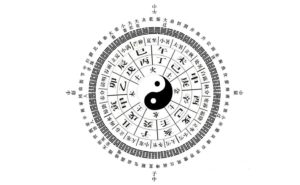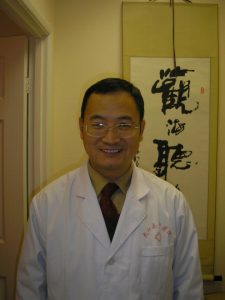Interviewed by Jo Reynolds
When did you move to the area?
I moved to Askew Road in August of 2015.
What made you decide to come to the UK?
I came to the UK to find a new life. Before I left China I worked for 18 years in Taihe Hospital, a county hospital in the east between Beijing and Shanghai. I went there straight from university, worked hard and reached the title of Deputy Chief Physician and was a medical director. But Chinese society changed rapidly. Bribery was very common and no one respects the rules. I could not stand the way it worked and I had to give up the hospital in search of a new life.
Another factor that encouraged me to come to the UK was my son’s education. Education for Chinese children is not good.
What is acupuncture?
Acupuncture uses very fine needles inserted into acupoints that sit on 14 meridians, energy pathways that run through the body from head to toe. Each meridian is associated with specific body parts. The meridians have been known in Chinese medicine for 3000 years. The needles stimulate the body to restore yin and yang balance, to rebalance the Qi (positive energy) of all the organs. Sometimes they are over-functioning and sometimes under-functioning.
Before treatment, I diagnose. This involves talking to the patient about the complaint, symptoms, sleep pattern, diet and medical history. Then I do a physical assessment: pulse, tongue, et cetera.
This helps me know where to focus the treatment. There are 360 acupoints(361 acupoints) and some new patients worry that I will cover them with needles but I commonly use 5 to 6, maybe a dozen and sometimes just one. This morning a man came in with a pain in his knee and I used just one pin in his ankle. The results can be instant.
Does it work?
It does work. Ask my patients. I cannot show you how it works because the same treatment cannot be repeated on two different people. Modern research requires double-blind controlled tests, which cannot be done with this form of treatment so some scientists dismiss it. Modern science still does not fully understand the mechanism of acupuncture, but much research suggests that the acupuncture needles provoke a reflex reaction in the immediate area and in surrounding tissue, even extending to the whole body, mainly through the blood vessels. This stimulus provokes the body’s ability to repair and regulate itself, and boost its immunity.
Do you practice any other medical remedies?
Yes, I also do traditional Chinese medicine: Moxibustion, burning the dried leaves of the moxa plant, a herb like mugwort; Hot Cupping therapy, where warm cups on the skin encourage local circulation; Tui Na massage, similar to sports physio; and Qigong therapy, which is healing hands following the meridian lines, plus I teach gentle exercise movements like Tai Chi.
What are the main differences between Chinese and Western medicine? And which is better?
Both are effective, but Western medicine and Chinese medicine are based on different foundations. Western medicine is based on the study of anatomy and laboratory research, with biochemistry and in support. Chinese medicine combines ancient philosophy, astronomy, climate change, geography, psychology and sociology.
Although the surgery and antibiotics of Western medicine are irreplaceable for the restoration of bodily functions, Chinese medicine works better at restoring and improving the body’s natural resistance to disease. Also, Chinese medicine has an outstanding performance in psychological treatment.
Because Chinese medicine uses natural ingredients that are not expensive, there is no need to replicate them with synthetic drugs so there is little profit for the pharmaceutical companies. This explains why traditional Chinese medicine develops slowly.
Are the Chinese healthier than the British?
There are many factors that affect the health of a country, such as its economy. Britain is a developed country and Western science and technology are very advanced. Small changes in social class lead to a stable society. Everyone in Britain enjoys the benefit of the NHS, which should be a model for the world. Considering the above factors, the overall health status of British citizens should be better.
Meanwhile, China is developing quickly. The deterioration of the natural environment is causing drastic changes in people’s lifestyle, their mentality, eating habits… Health issues such as diabetes, hypertension, stroke, heart attack, and cancer are on the rise in China, which all causes tremendous pressure on families.
Living in constant change of economic growth, Chinese people do not pay enough attention to their personal health but prioritise making money first. Other factors, such as migrant workers moving into big cities to do seasonal jobs, lead to family separation and mental anxieties, which all threaten health.
In China, antibiotics and steroids are not tightly controlled. The misuse of antibiotics allows diseases to grow rapidly. However, the (Chinese) government has taken note of this and things are getting better.
Do you have acupuncture and, if yes, who do you go to?
Yes, ever since my toothache. I would let another experienced and qualified Chinese doctor do acupuncture for me.
What do you miss about China?
I miss my mother. And my relatives and friends. They did not wish me to leave. Separation from loved ones is painful, but I visit regularly.
What’s the best life lesson you’ve been given?
Safety first. And do not over-treat.
Back in 2005, it was summer and a consultant from the surgical ward invited my advice on a patient with a high fever. Checking the medical records, the patient already had the fever for 21 days with a body temperature of around 40 degrees Celsius. The patient had been drip-fed triple dose antibiotics every day, as well as suppositories, but their white blood cell level was still very low.
After my consultation, I asked the doctors to stop all antibiotics and suppositories. I then administered three different kinds of herbs, boiled down into a syrup like a cough medicine to be taken orally. That day, the patient’s body temperature dropped to 37.6 degrees Celsius. We continued with the herbs with adjusted doses for a week and the patient’s temperature dropped to normal after a week and was discharged. The last time I went to visit China on holiday, the president of the hospital invited me to a dinner and told me the consultant was still telling everyone about that case from over a decade ago.
What life lesson would you share?
When I was studying at university before working in the hospital, our teacher told us to treat patients with great care. He was very serious. He said: No smiling! But when I got to the hospital, I was told to treat patients amiably so they will like you and then trust you.
Thank you, Dr Zhou. It’s been a real pleasure to meet you.

